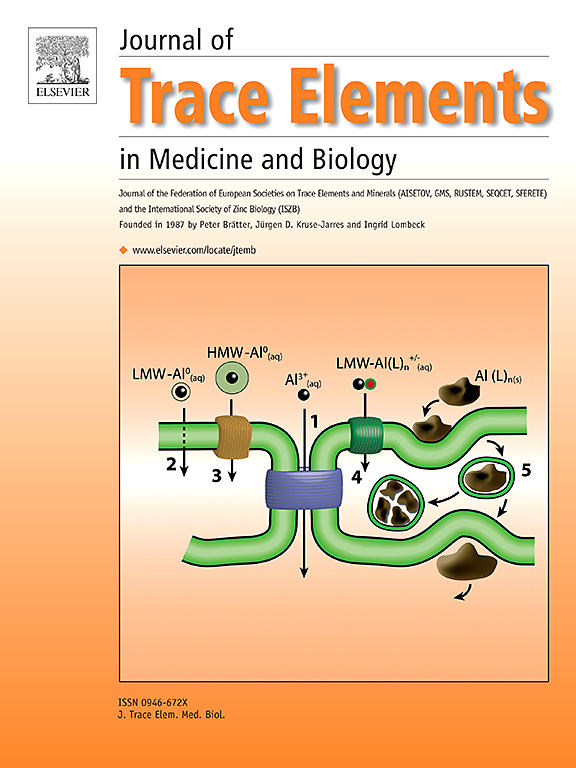缺锌会影响纯化 B 细胞中人类调节性 B 细胞的发育。
IF 3.6
3区 医学
Q2 BIOCHEMISTRY & MOLECULAR BIOLOGY
Journal of Trace Elements in Medicine and Biology
Pub Date : 2024-10-20
DOI:10.1016/j.jtemb.2024.127556
引用次数: 0
摘要
锌是一种重要的微量元素,对许多不同的免疫过程和充分发挥功能非常重要。众所周知,B 细胞的发育依赖于充足的锌供应。最近发现了一种调节性 B 细胞(Breg)群,即 CD19+IL-10+ B 细胞,它们能够通过分泌 IL-10 等抗炎细胞因子来调节免疫反应。由于 Bregs 能促进抗炎环境,因此可以减少甚至防止过度的促炎反应。因此,拥有并维持 Bregs 对过敏、哮喘和自身免疫性疾病患者很有意义。因此,了解 Breg 的生成、所需的信号传导及其发育要求非常重要。由于我们的研究小组之前已经证明锌对调节性 T 细胞很重要,因此我们的目的是确定缺锌对人类外周血 CD19+ B 细胞 Breg 发育的影响。我们观察到,在 CD40L 和类收费受体(TLR)配体 CpG-ODN2006 的联合刺激下,Breg 的生成量最高。利用这种刺激,我们观察到缺锌培养基显著减少了纯化 B 细胞的 Breg 生成。而在未进行 B 细胞富集的外周血单核细胞(PBMCs)中生成的 Bregs 则没有出现这种情况,这表明存在一种补偿机制。与文献一致,我们的数据也证实了 Bregs 是由 CD19+ B 细胞发展而来的,因为 CD19+ 的总频率保持不变,而 Breg 的频率则因刺激和锌培养基条件的不同而不同。我们的研究首次表明,缺锌会显著影响 Breg 的发育,这为临床应用和治疗策略提供了一个重要的新视角。本文章由计算机程序翻译,如有差异,请以英文原文为准。
Zinc deficiency impairs the development of human regulatory B cells from purified B cells
Zinc is a vital trace element, important for many different immune processes and adequate functionality. B cell development is known to be dependent on sufficient zinc supply. Recently a regulatory B cell (Breg) population has been identified, as CD19+IL-10+ B cells, able to regulate immune responses by secretion of anti-inflammatory cytokines, such as IL-10. Due to their promotion of an anti-inflammatory milieu, Bregs could reduce or might even prevent excessive pro-inflammatory responses. Hence, having and maintaining Bregs could be interesting for patients suffering from allergies, asthma, and autoimmune diseases. Therefore, understanding Breg generation, required signaling, and their developmental requirements are important. Since our group could previously show that zinc is important for regulatory T cells, we aimed to determine the effect of zinc deficiency on Breg development from human peripheral blood CD19+ B cells. We observed highest Breg generation with a combined stimulus of CD40L and the toll like receptor (TLR) ligand, CpG-ODN2006. Using this stimulus, we observed that zinc deficient medium significantly decreased Breg generation from purified B cells. This was not seen in Bregs generated from peripheral blood mononuclear cells (PBMCs) without B cell enrichment suggesting a compensatory mechanism. In line with literature, our data also confirms Bregs develop from CD19+ B cells, since total CD19+ frequencies remained unchanged, while Breg frequencies varied between stimuli and zinc media conditions. Our study shows for the first time that zinc deficiency significantly impairs Breg development, which provides an important new perspective for clinical applications and therapeutic strategies.
求助全文
通过发布文献求助,成功后即可免费获取论文全文。
去求助
来源期刊
CiteScore
6.60
自引率
2.90%
发文量
202
审稿时长
85 days
期刊介绍:
The journal provides the reader with a thorough description of theoretical and applied aspects of trace elements in medicine and biology and is devoted to the advancement of scientific knowledge about trace elements and trace element species. Trace elements play essential roles in the maintenance of physiological processes. During the last decades there has been a great deal of scientific investigation about the function and binding of trace elements. The Journal of Trace Elements in Medicine and Biology focuses on the description and dissemination of scientific results concerning the role of trace elements with respect to their mode of action in health and disease and nutritional importance. Progress in the knowledge of the biological role of trace elements depends, however, on advances in trace elements chemistry. Thus the Journal of Trace Elements in Medicine and Biology will include only those papers that base their results on proven analytical methods.
Also, we only publish those articles in which the quality assurance regarding the execution of experiments and achievement of results is guaranteed.

 求助内容:
求助内容: 应助结果提醒方式:
应助结果提醒方式:


